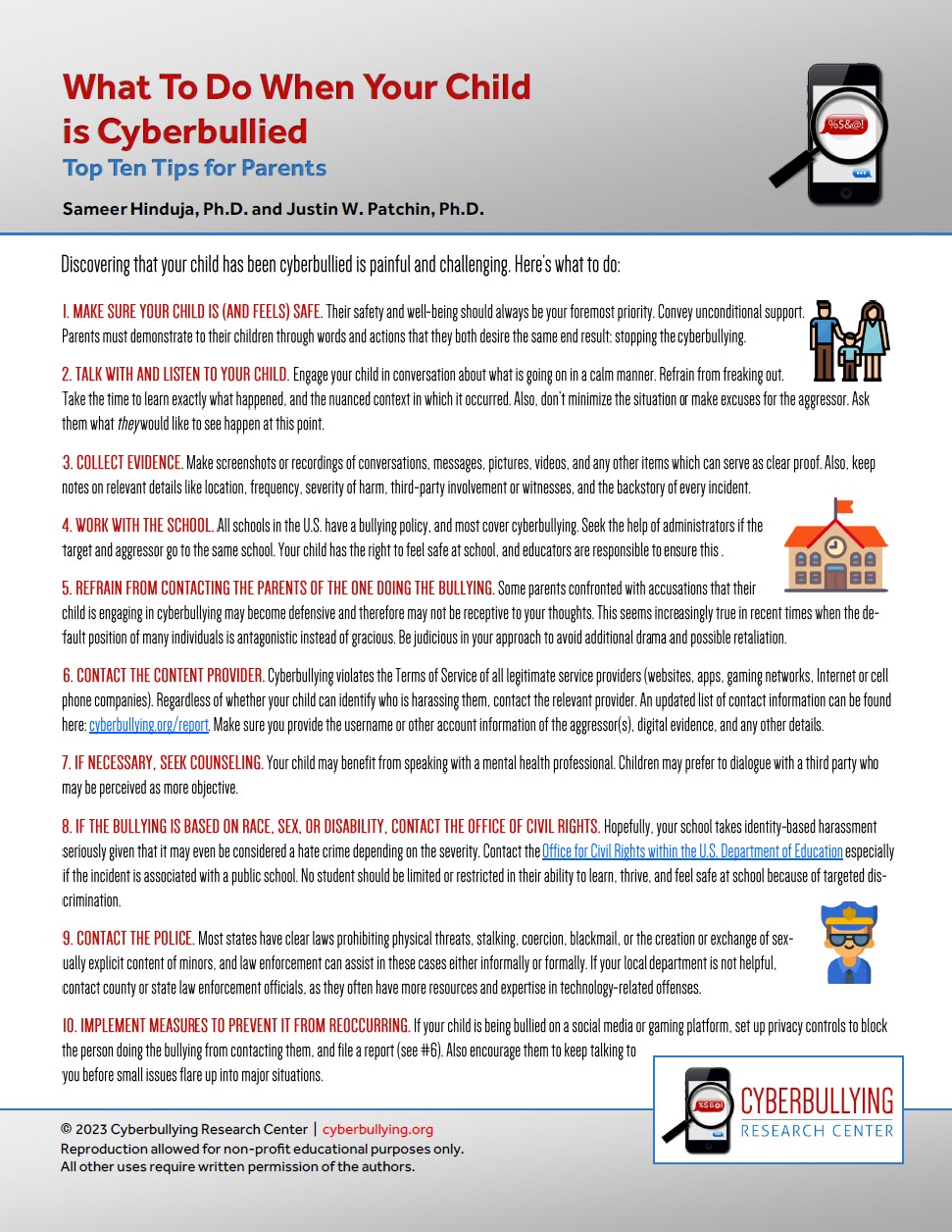
(For a formatted .pdf version of this article for distribution, click on the image above [or click here]).
Spanish Translation Available Here
Discovering that your child is being cyberbullied is painful and challenging. Here’s what to do:
1. MAKE SURE YOUR CHILD IS (AND FEELS) SAFE. Their safety and well-being should always be your foremost priority. Convey unconditional support. Parents must demonstrate to their children through words and actions that they both desire the same end result: stopping the cyberbullying.
2. TALK WITH AND LISTEN TO YOUR CHILD. Engage your child in conversation about what is going on in a calm manner. Refrain from freaking out. Take the time to learn exactly what happened, and the nuanced context in which it occurred. Also, don’t minimize the situation or make excuses for the aggressor. Ask them what they would like to see happen at this point.
3. COLLECT EVIDENCE. Make screenshots or recordings of conversations, messages, pictures, videos, and any other items which can serve as clear proof. Also, keep notes on relevant details like location, frequency, severity of harm, third-party involvement or witnesses, and the backstory of every incident.
4. WORK WITH THE SCHOOL. All schools in the U.S. have a bullying policy, and most cover cyberbullying. Seek the help of administrators if the target and aggressor go to the same school. Your child has the right to feel safe at school, and educators are responsible to ensure this .
5. REFRAIN FROM CONTACTING THE PARENTS OF THE ONE DOING THE BULLYING. Some parents confronted with accusations that their child is engaging in cyberbullying may become defensive and therefore may not be receptive to your thoughts. This seems increasingly true in recent times when the default position of many individuals is antagonistic instead of gracious. Be judicious in your approach to avoid additional drama and possible retaliation.
6. CONTACT THE CONTENT PROVIDER. Cyberbullying violates the Terms of Service of all legitimate service providers (websites, apps, gaming networks, Internet or cell phone companies). Regardless of whether your child can identify who is harassing them, contact the relevant provider. An updated list of contact information can be found here: cyberbullying.org/report. Make sure you provide the username or other account information of the aggressor(s), digital evidence, and any other details.
7. IF NECESSARY, SEEK COUNSELING. Your child may benefit from speaking with a mental health professional. Children may prefer to dialogue with a third party who may be perceived as more objective.
8. IF THE BULLYING IS BASED ON RACE, SEX, OR DISABILITY, CONTACT THE OFFICE OF CIVIL RIGHTS. Hopefully, your school takes identity-based harassment seriously given that it may even be considered a hate crime depending on the severity. Contact the Office for Civil Rights within the U.S. Department of Education especially if the incident is associated with a public school. No student should be limited or restricted in their ability to learn, thrive, and feel safe at school because of targeted discrimination.
9. CONTACT THE POLICE. Most states have clear laws prohibiting physical threats, stalking, coercion, blackmail, or the creation or exchange of sexually explicit content of minors, and law enforcement can assist in these cases either informally or formally. If your local department is not helpful, contact county or state law enforcement officials, as they often have more resources and expertise in technology-related offenses.
10. IMPLEMENT MEASURES TO PREVENT IT FROM REOCCURRING. If your child is being bullied on a social media or gaming platform, set up privacy controls to block the person doing the bullying from contacting them, and file a report (see #6). Also encourage them to keep talking to you before small issues flare up into major situations.
Citation information: Hinduja, S. & Patchin, J. W. (2023). What to do when your child is cyberbullied: Top ten tips for parents. Cyberbullying Research Center. Retrieved [insert date], from https://cyberbullying.org/tips-for-parents-when-your-child-is-cyberbullied.pdf
Keywords: teens, parents, victim, target, student








[…] https://cyberbullying.org/what-to-do-when-your-child-is-cyberbullied/ […]